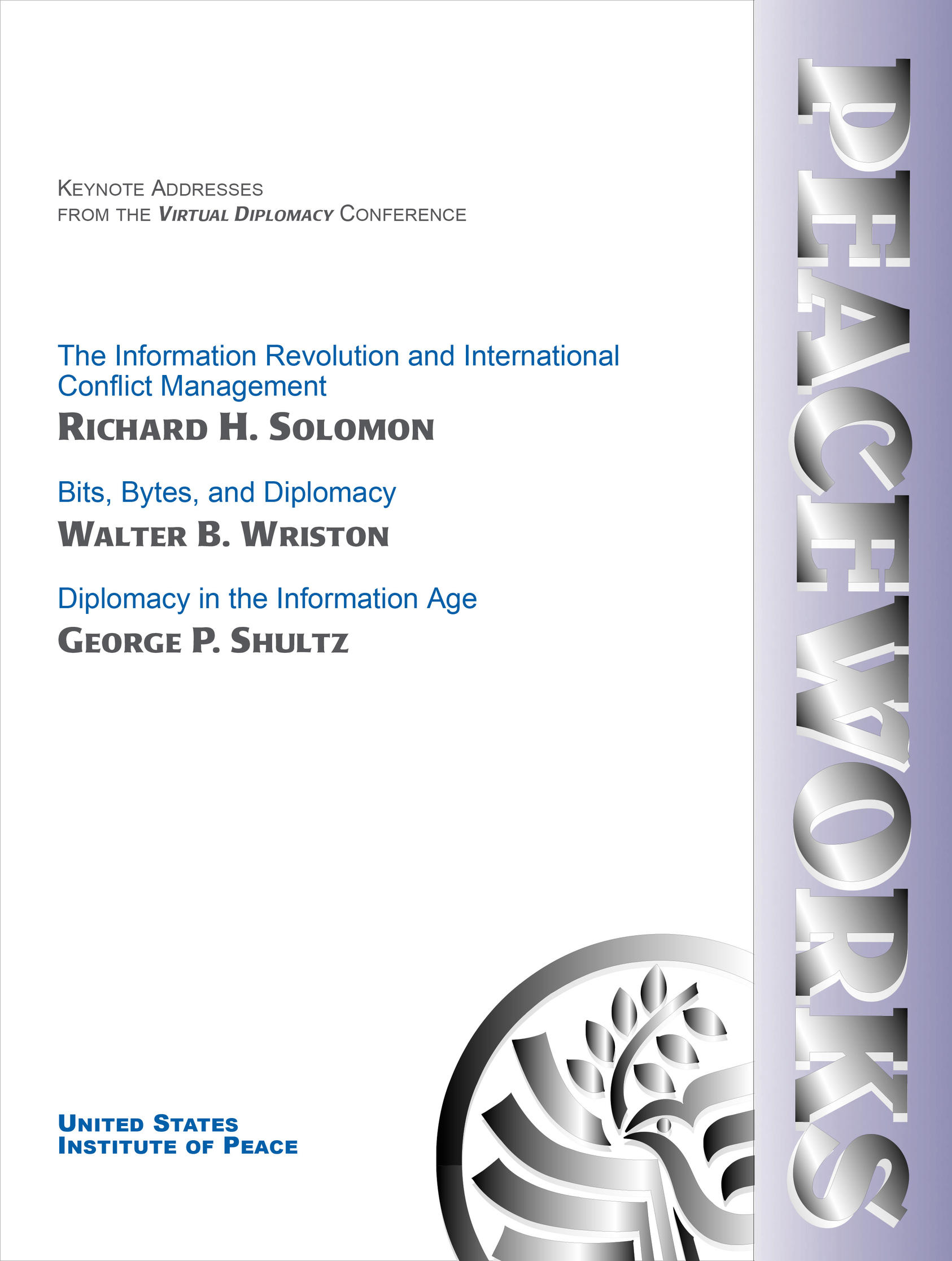Peaceworks No. 18
Presented in this Peaceworks is a representative portion from the conference--"Virtual Diplomacy: The Global Communications Revolution and International Conflict Management" held April 1–2, 1997. Included in the report are the conference's keynote speakers: Institute president Richard H. Solomon, former assistant secretary of state for East Asian and Pacific affairs, who opened the conference with a conceptual overview of the Virtual Diplomacy project; Walter Wriston, former chairman and CEO of Citicorp/Citibank; and former secretary of state George Shultz, professor of international economics at Stanford University's Graduate School of Business and a distinguished fellow at the Hoover Institution. Each in his own right captures the best thinking of several communities represented at the conference.
About the Authors
Sheryl J. Brown is director of communications at the United States Institute of Peace. She came to the Institute after serving as deputy associate director of Boston University’s Institute for Democratic Communication (based in Washington, D.C.) in 1988–89. Prior to that, she was a fellow at the Institute for Philosophic Studies at the University of Dallas (1973–85), and director of the library at the Northwood Institute in Texas (1979–81). Brown has written and edited various publications on foreign and public policy issues, philosophy, and literature, and was coeditor of Resolving Third World Conflicts: Challenges for a New Era (United States Institute of Peace Press, 1992). Since 1991, she has been an instructor of classical Greek history at Georgetown University.
George P. Shultz served as the sixtieth U.S. secretary of state from 1982 to 1987. He has been a professor of industrial relations on the faculties of the Massachusetts Institute of Technology, the University of Chicago Graduate School of Business, and Stanford University. Shultz’s other government positions include senior staff economist on the Eisenhower administration’s Council of Economic Advisors, secretary of labor and director of the Office of Management and Budget in the Nixon administration, secretary of the treasury and chairman of the Council on Economic Policy from 1972 to 1974, and chairman of President Reagan’s Economic Policy Advisory Board. From 1974 until his appointment as secretary of state, he was president of the Bechtel Group. Shultz was awarded the Medal of Freedom, the nation’s highest civilian honor, in 1989. In that year, he rejoined Stanford University’s faculty as professor of international economics at the Graduate School of Business and as a distinguished fellow at the Hoover Institution. His publications include Turmoil and Triumph: My Years as Secretary of State (1993), Economic Policy Beyond the Headlines (1978), and Management Organization and the Computer (1960).
Richard H. Solomon has been president of the United States Institute of Peace since 1993. As assistant secretary of state for East Asian and Pacific affairs from 1989 to 1992, he negotiated the first UN "Permanent Five" peacemaking agreement for Cambodia, had a leading role in the dialogue on nuclear issues among the United States and South and North Korea, helped establish the Asia-Pacific Economic Cooperation (APEC) forum, and led U.S. negotiations with Japan, Mongolia, and Vietnam on important bilateral matters. In 1992–93, Solomon served as U.S. ambassador to the Philippines, coordinating the closure of U.S. naval bases and developing a new framework for bilateral and regional security cooperation. He previously served as director of policy planning at the Department of State (1986–89) and senior staff member of the National Security Council (1971–76), where he was involved in the process of normalizing relations with the People’s Republic of China. From 1976 to 1986, he was head of the social science department at the RAND Corporation. In 1995, Solomon was awarded the State Department’s Foreign Affairs Award for Public Service for his role in obtaining international agreement for, and fostering the implementation of, the UN peace plan for Cambodia.
Walter B. Wriston retired as chairman and chief executive officer of Citicorp and its principal subsidiary, Citibank, N.A., in 1984, after serving as CEO for seventeen years and in various other positions with the company for thirty-eight years. Following a year’s service as a U.S. State Department officer and a four-year tour with the U.S. Army during World War II, Wriston joined Citibank in 1946 as a junior inspector in the Comptroller’s Division. He was assigned to the National Division in 1949, becoming an assistant vice president in 1952 and a vice president in 1954. Wriston joined the bank’s Overseas Division in 1956, was named a senior vice president in 1958, and was appointed executive vice president in 1960. Wriston became president and CEO of the bank in 1967 and of the corporation when it was formed in 1968; he was appointed chairman in 1970. He was chairman of President Reagan’s Economic Policy Advisory Board, a member and chairman of the Business Council, and a co-chairman and policy committee member of the Business Roundtable. Wriston’s published works include Risk and Other Four-Words and The Twilight of Sovereignty.
